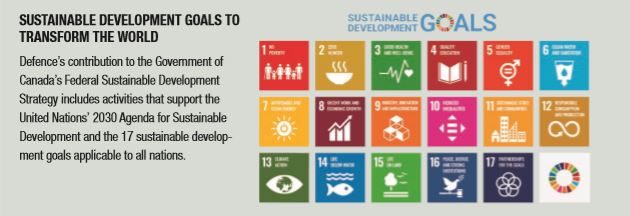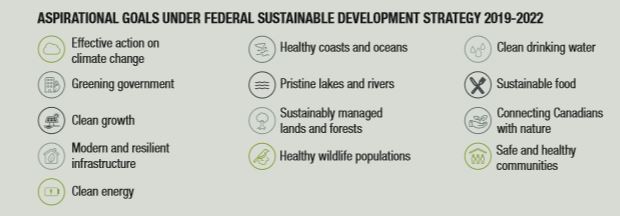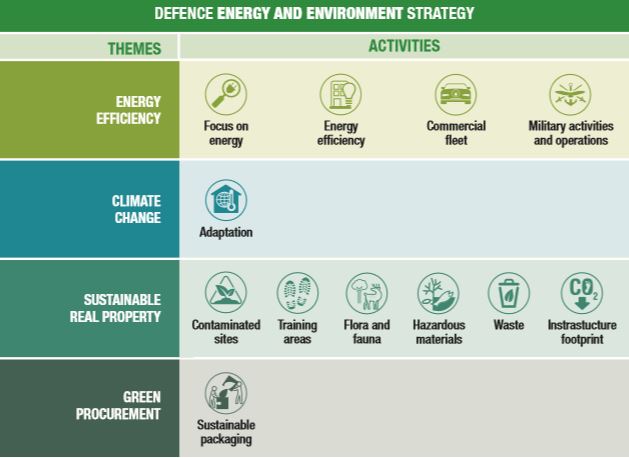1. Introduction
1.1 THE FUTURE OF CANADA’S MILITARY
Canada’s defence policy, Strong, Secure, Engaged (SSE) sets out the vision for the Canadian Armed Forces (CAF). To deliver on this vision, Defence is transforming to become more modern, agile, and better equipped to respond to 21st century challenges, such as terrorism, climate change impacts, and vulnerabilities in the space and cyber domains. This transformation also presents a unique opportunity for Defence to build on our long history of environmental stewardship, while greening the way we operate.
SSE initiative 101 and 102 reflect commitments for the responsible management of energy, lands and infrastructure, and greenhouse gas (GHG) emissions to meet government greening targets. Military operations and environmental protection and stewardship are not mutually exclusive. Minimizing the environmental impact of Defence activities is necessary for operational success, whether at home or abroad.
1.2 THE ROLE OF DEFENCE IN ENERGY AND ENVIRONMENTAL MANAGEMENT
The Defence Energy and Environment Strategy (DEES) provides the department with renewed direction to evolve as an environmentally sustainable organization, better manage our energy use and minimize our environmental footprint across a broad spectrum of activities. The DEES aligns Defence, where appropriate, with Canadian and United Nations direction on sustainable development. Defence is among the federal government’s largest employers and maintainers of equipment and real property in Canada. The Royal Canadian Navy (RCN), Canadian Army (CA) and Royal Canadian Air Force (RCAF) operate and train over large areas of sea, land, and airspace. In Canada alone, Defence is entrusted with managing approximately 2.1 million hectares of land and 20,000 buildings. We have a responsibility to show leadership in environmental and energy sustainability, and an obligation to manage our assets and operations efficiently.


1.3 ENGAGEMENT OF INDIGENOUS PEOPLES
The Government of Canada (GoC) is committed to advancing reconciliation and renewing its relationship with Indigenous peoples based on recognition of rights, respect, cooperation and partnership. In support of whole-ofgovernment commitments and the United Nations Declaration on the Rights of Indigenous Peoples, Defence will fulfill commitments reflected in statutes, negotiated agreements and treaties, court decisions and policies through meaningful engagement with Indigenous groups in the early planning stages of its operations. We will engage, collaborate or partner with Indigenous groups on a range of operational and policy matters, including environmental remediation, land access, consultation, procurement, and major construction projects.
We are committed to promoting Indigenous economic development through a number of different GoC mechanisms that provide benefits to Indigenous people, businesses, and communities through procurement. Defence will support Public Services and Procurement Canada’s (PSPC) commitment for all departments to have at least 5% of federal contracts awarded to businesses managed and led by Indigenous Peoples. We will consider Indigenous businesses in all areas of green procurement including when purchasing clean electricity or developing energy performance contracts, whenever capacity and capability allow.

The Drummers and Dancers of Kitigan Zibi, Rapid Lake, Pikwaknigan and Atikamekw perform during Fortissimo 2019 on Parliament Hill in Ottawa, Ontario, July 18th, 2019. Photo: Ordinary Seaman Alexandra Proulx Director of Army Public Affairs © 2019 DND-MDN Canada
1.4 ACHIEVING THE VISION

THE ROAD TRAVELLED
Defence tabled its first DEES in October 2017 in keeping with the Federal Sustainable Development Strategy (FSDS) goals to which we contribute, as well as the greening initiatives laid out in Strong, Secure, Engaged.
As of 2019-2020, DND had fulfilled 82% of the commitments in the first DEES. Below are some highlights of the energy and environment achievements over the past year. For more information on the department’s plans, priorities, and results achieved, see our Departmental Results Report.
To help the GoC reduce GHG emissions, we have implemented energy performance contracts, designated energy managers at all bases and wings across the country, purchased clean power, greened our commercial light-duty vehicle fleet, and invested in energy efficient buildings and upgrades to existing facilities. As of 2019-20, Defence had reduced GHG emissions from our buildings and non-military vehicles by about 31% from 2005 levels.
THE ROAD AHEAD
Delivering on the Defence mission depends on sound energy management, the resilience of key infrastructure to climate change, meeting environmental regulatory requirements, and sustainably managing lands and resources to keep our communities safe and healthy. Contributing to Canada’s sustainable development goals by integrating energy and environmental considerations into Defence’s business processes and by using policy tools such as strategic environmental assessments and gender-based analysis will help us deliver on our mission. The 2020-2023 DEES provides a framework for managing energy and environmental activities that support a sustainable and modern military.
The DEES reinforces energy- and environmentally-conscious behaviour among Defence personnel, and ensures sustainability and energy efficiency are factored into our decision making.
The DEES aims to achieve three objectives:
- Less energy waste and cleaner energy: Reduce the energy demand for Defence by ensuring systems and processes are in place to measure performance; increase energy efficiency and conservation measures in all aspects of Defence business; and move to loweremission and more sustainable energy sources, such as hydro, wind and solar.
- Reduce climate change risks: Assess the risk to Defence programs, critical infrastructure, operational and non-operational activities, and training to ensure we are ready to adapt to the changing climate.
- Reduce Defence environmental footprint: Reduce impacts to land, air and water from the infrastructure portfolio, commercial and operational fleets, and equipment.
To achieve these objectives, Defence has committed to 16 targets in the 2020-2023 DEES with activities grouped into four themes:
- Energy efficiency;
- Climate change;
- Sustainable real property; and,
- Green procurement.
These themes and activities complement existing energy and environmental programs and projects and will guide Defence in improving our sustainability, energy and environmental performance.
